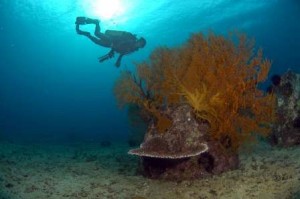By Abbie Haskell, Contributing Writer
Northborough/Southborough – When one thinks of climate change, things such as melting icebergs, sweltering summers, snowless winters, and extreme weather events come to mind. But what is also happening beneath the surface of some of the globe's oceans is that a species of fish is searching for a new home because the coral reef it has lived in for decades is no longer habitable. Chris Mitchell of Algonquin Regional High School (ARHS) has decided that must change.
Mitchell, a senior at ARHS, is determined to reverse the effects that climate change has in our oceans through the restoration of coral reefs. His ?interest in for the cause began in Australia, when he went scuba diving on the Great Barrier Reef. But, in addition to seeing coral reefs with millions of fish species, Mitchell learned that the reefs full of marine life are deteriorating and falling to ruin. When he got home from his vacation, Mitchell reached out to the New England Aquarium School to learn more about the growing problem. For a year he studied oceans and how marine species interact with each other. He graduated from the New England Aquarium School with an enlightened view of the oceans and he knew that he had to do something about climate change's effects in our oceans.
Mitchell also joined the Sea Scouts, a nautical division of the Boy Scouts, where he decided to combine his knowledge and love of the ocean with his determination to help the coral reefs for his Eagle Project. Through the Sea Scouts, Mitchell got in touch with the Reefball Foundation, a nonprofit organization that gives grants for the restoration of coral reefs. Reefball increases awareness about the deteriorating coral reefs and teaches people how to fix them. They build artificial coral reefs, known as Reefballs, and place them in the ocean to give a home to fish. For his Eagle Project, Mitchell knew he wanted to build his own artificial reef. It took him over a year and he worked with several organizations and local businesses to develop the perfect Reefball. The Reefballs that Mitchell has built have been four or five feet wide and weigh about 200 pounds. He placed the Reefball in Oleta State Park in Miami, Fla.
When Mitchell returned there a year later, he discovered that a new species of fish, not indigenous to that area, had taken residence. The most remarkable thing about Reefballs is that they can be built within a year, whereas natural coral reefs take hundreds of years to grow. Unlike most artificial coral reefs, Reefballs are customizable based on location, which makes them endlessly versatile.
While these Reefballs are taking an enormous step towards reversing the effects of climate change in the ocean, a lot of people are unaware that there is even a problem. Currently, Mitchell is raising coral reef damage awareness in younger children in his community. He's been working with kids of various ages through organizations such as the Girl Scouts and Think Tank of Worcester. Mitchell shares his knowledge of coral reef damage with the children and hopes they will continue to spread the message. While raising awareness, he has also helped these children build their own Reefballs. Reefballs made by the children of these communities have also been placed in Oleta River State Park, where they give homes to many marine species.

















